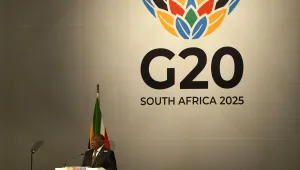The recent Palestinian election is a setback to the fragile peace process and a possible tragedy for Palestinians, who are likely to be the biggest losers. Nonetheless, international financial support for the Palestinian Authority should continue for the time being.
Hamas is certain to form a government, and leaders in surrounding countries like Egypt, with strong Islamic groups, are becoming increasingly nervous.
Is Hamas furthering a dangerous fundamentalist trend that will indefinitely derail the peace process and add to instability in the region?
Despite the election taking place with a strong endorsement from the U.S. government, many felt it should have been postponed—including Palestinian President Mahmoud Abbas.
The turmoil in the region was not conducive to a rational election. It was expected that the Hamas candidates would do well, but no one predicted a landslide victory.
The election result was partly due to the persistent corruption in the Palestinian Authority, the lack of tangible results from the peace process and high unemployment among Palestine's youth population. Hamas was viewed as a desperate solution to what seemed to them a hopeless situation.
Now, the international community is struggling to formulate an appropriate response to Hamas' historically hard-line position against a peaceful solution with Israel. Since the Oslo accords, the U.S. and many European countries have been contributing most of the day-to-day support of the Palestinian Authority. This has become the bread and butter that supports most of the governmental activities for the economically disadvantaged Palestinian population.
Halting this aid is likely to have two consequences: First, internally, it will create additional sympathy for Hamas and further bolster its image as the government for the underdog.
It will enhance its political status and push it further away from the peace process. Second, isolating Hamas now will increase the Arab world's hostility toward the West. This may translate into additional financial support that could further embolden Hamas. Syria, Iran and numerous Islamic groups would likely replace much of any discontinued support from the United States and Europe and in return achieve political leverage.
Once in power, Hamas will be quick to realize the political and economic realities. Governing from within will have a totally different dimension.
Hamas will comprehend that it cannot function without the massive financial aid that has been pouring in from the international community. Lacking this essential aid, Hamas will be unable to pay for public-sector services. It will also undoubtedly cripple the fragile economy, which has experienced a general decline since the second intifada began in September 2000.
Hopefully, the Hamas leadership will recognize that it needs to be part of the global community and understand, like most of the Arab world, that Israel is here to stay.
The U.S. and the European Union should give Hamas a short period of time to rethink its hard-line policies. This will allow the new government to emerge from the euphoria of victory to realpolitik.
If Hamas fails to alter its intolerant objectives, the peace process in the Middle East will be in jeopardy.
At that point, the U.S. and the EU would need to find an alternative aid solution that would alleviate the suffering of Palestinians and bypass Hamas in the process.
The emergence of Hamas as a political force may go either way. Though unlikely, Hamas may surprise the international community and emerge as a powerful partner of peace. This possibility should propel the U.S. and the European community to give Hamas the chance to sober up and alter its course.
Raja Kamal is associate dean for resource development at the Harris School for Public Policy at the University of Chicago
Kamal, Raja. “Leveraging Aid to the Palestinians.” Chicago Tribune, February 3, 2006

